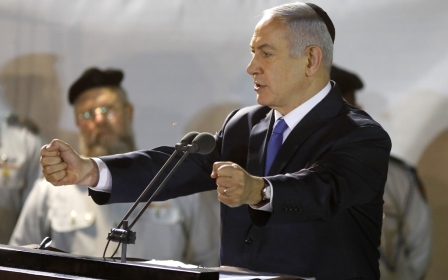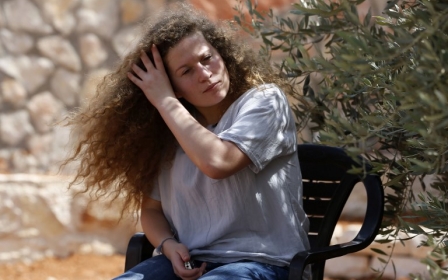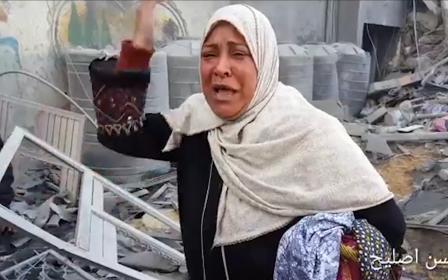Israeli forces briefly detain 15-year-old brother of Ahed Tamimi

Israeli forces raided the home of prominent former prisoner Ahed Tamimi overnight and detained her 15-year-old brother Mohammed in the occupied West Bank village of Nabi Saleh, their father told Middle East Eye.
The teenager was released on bail on Monday evening after some 17 hours in custody.
"They stormed in at around 2:30 am. We woke up to find that they had already barged into the house and were in his bedroom," Bassem Tamimi said in a phone interview on Monday. "They asked me to gather the whole family, and told us they were taking Mohammed in, but without any information as to why."
Mohammed and Ahed's mother, Nariman Tamimi, filmed the raid, showing at least 10 Israeli soldiers with automatic rifles in the Tamimi home to take Mohammed away, despite angry cries from his family.
The teenager is seen with his right wrist in a cast - due, Bassem said, to an injury he sustained after being hit by an Israeli tear gas canister during a protest on Saturday. Helping her son put a sock on an injured foot, Nariman is heard repeatedly telling her son to use his right to remain silent, and not to sign any documents or confess to anything under pressure.
Stay informed with MEE's newsletters
Sign up to get the latest alerts, insights and analysis, starting with Turkey Unpacked
In the footage, family members frequently broke into severe coughing fits, which Bassem said were the result of pepper spray and tear gas used by Israeli forces during the home raid.
Bassem told MEE that he has been summoned to a police station to pay a bail of 1,500 shekels ($418) for Mohammed, "pending the issuance of his charges and referral to court". Mohamed's cousin Moayed, who was also taken into custody and interrogated, was set similar bail conditions.
"It remains completely unclear to us what charges are the boys facing," Bassem said prior to the boys being released. "This is nothing but blackmail."
A family in the crosshairs
Ahed Tamimi, 18, gained international recognition as a symbol of resistance to the Israeli occupation after her arrest in December 2017.
The then-16-year-old was detained for slapping an Israeli soldier who raided her hometown of Nabi Saleh on the same day her cousin was shot in the head with a rubber-coated steel bullet by Israeli forces. Ahed and her mother, who was arrested for filming the incident and sharing it on social media, served eight months in prison for the incident, and were both released in July.
Ahed's arrest drew worldwide attention to Israeli policies of detention of Palestianians, particularly women and minors. Publication of video footage of her interrogation by Israeli officers sparked outrage over their use of sexual harassment as an intimidation tactic to elicit a confession.
In the wake of Ahed's detention, the family has been under increased pressure by Israel. Ahed's 22-year-old brother Waed was detained in an overnight raid. In August, he was sentenced to 14 months in prison for throwing stones at Israeli border police. The Israeli army had initially said he was detained for “suspected involvement in popular terror acts”.
Between May, when Waed was detained, and July, when Ahed and Nariman were released, half of the Tamimi family was held in Israeli prisons - with Bassem, Mohammed and 12-year-old Salem still free.
The village of Nabi Saleh, located in the central West Bank, has for years been a prominent centre of activism against the occupation and has often been subjected to military suppression of protests.
Israeli army detention raids are a nightly occurrence across the occupied West Bank. According to Palestinian prisoners’ rights group Addameer, 5,450 Palestinians were detained by Israel as of March.
Middle East Eye delivers independent and unrivalled coverage and analysis of the Middle East, North Africa and beyond. To learn more about republishing this content and the associated fees, please fill out this form. More about MEE can be found here.




